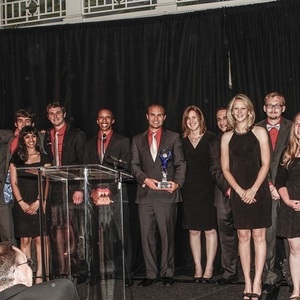Ohio State team wins EcoCar 2 Competition with E85-fueled car

EcoCAR 2
June 18, 2014
BY EcoCAR 2
On June 13, U.S. Department of Energy and General Motors Co. announced the winning team of the North American EcoCAR 2 Competition. The winner was the Ohio State team, as they took home the overall winners title at the EcoCAR 2: Plugging In to the Future finals.
The team’s exceptionally engineered 2013 Chevrolet Malibu with energy storage, electric drive and ethanol (E85) fueled engine technology, earned them the top honor.
EcoCAR 2 – a three-year competition managed by Argonne National Laboratory and sponsored by the DOE, GM and 30 other government and industry leaders – gave students the opportunity to gain real-world automotive engineering experience while striving to improve the environmental impact and energy efficiency of an already efficient vehicle – the 2013 Chevrolet Malibu.
Advertisement
Over the course of three years, The Ohio State consistently met incremental goals that strengthened their position against the other university teams. Their series-parallel plug-in hybrid Malibu excelled at GM’s Proving Grounds in Milford, Michigan, earlier this month, where it was put through a series of strenuous technical and safety tests similar to those used for real-world production vehicles.
“The EcoCAR 2 competition has been an incredible journey and learning experience for everyone at Ohio State, and that’s what really matters – winning the top spot is just a bonus,” said Katherine Bovee from Ohio State. “We are all excited to take everything we have learned into the workplace after graduation.”
The teams’ unique design achieved 50 miles per gallon gas equivalent (MPGGE), while using 315 watt-hours per mile (Wh/mi) of electricity. The vehicle impressed the judges with stellar number and even lessened the amount of criteria emissions by half, compared to the base vehicle.
Advertisement
“Ohio State met and exceeded the EcoCAR 2 goals at every point in the competition,” said Michael Knotek, deputy under secretary for science and energy at the DOE. “Their innovative work has contributed significantly to the future of energy efficient technology in the automotive industry, and we wish all members of the team the best as they move forward in the next step of their careers, whether in the classroom or in the professional world.”
The second-place team from the University of Washington demonstrated the most energy-efficient vehicle, a B20 biodiesel parallel plug-in hybrid reaching 60 MPGGE and 333 Wh/mi of electricity, as well as the lowest well-to-wheel greenhouse gas emissions. Pennsylvania State University placed third with their E85 series plug-in hybrid.
“For the past three years all 15 EcoCAR 2 teams have worked tirelessly to design the next generation of clean vehicles and we have seen exceptional outcomes,” said Ken Morris, vice president, global product integrity, General Motors. “Ohio State stood out amongst the competition and truly did an outstanding job. All of the teams have helped advance innovative vehicle technology and improve the automotive industry and we thank them for their hard work, dedication and enthusiasm for this program.”
Related Stories
Marathon Petroleum Corp. on Aug. 5 released second quarter financial results, reporting improved EBITDA for its renewable diesel segment. The company primarily attributed the improvement to increased utilization and higher margins.
Chevron Corp. on Aug. 1 confirmed the company started production at the Geismar renewable diesel plant in Louisiana during the second quarter after completing work to expand plant capacity from 7,000 to 22,000 barrels per day.
The public comment period on the U.S. EPA’s proposed rule to set 2027 and 2027 RFS RVOs and revise RFS regulations closed Aug. 8. Biofuel groups have largely expressed support for the proposal but also outlined several ways to improve the rulemaking.
In celebration of World Biodiesel Day, MOL Group on Aug. 8 announced SAF was successfully produced for the first time at INA’s Rijeka Refinery during a pilot project to process biocomponent. Renewable diesel was also produced.
Iowa farmers have a new market opportunity for their 2025 soybean crop. Landus is expanding its Clean Fuel Regulation initiative, made possible by recent policy changes expected to increase Canada's demand for liquid biofuel.
Upcoming Events










